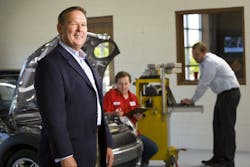You don’t achieve what Jim Keller has accomplished by accident—it’s all about your ability to lead, he says.
Keller’s leadership skills have taken him far in the collision repair industry, which he has dedicated himself to for 35 years. Since opening his own shop back in 1981, Keller has gone on to become a multi-shop operator, serve as chairman of the Automotive Service Association and state chairman for the Wisconsin I-CAR committee, and start the Midwest-based 21-shop 1Collision Network.
But Keller wasn’t always a great leader—in fact, as he’ll tell you, at one time, he had no idea how to lead a team to success.
“I didn’t have any concept of how to connect with others,” he says. “It’s something you need to learn and practice over time.”
After attending Dale Carnegie Training—widely considered the country’s best source for leadership training—he started to make his transition. And now as president of 1Collision Network, Keller shares what allows him to effectively motivate and lead hundreds of employees to success.
1. Invite others to come along with your vision.
“Where does it all start when you’re a leader?”
That’s the question Keller wants you to ask yourself. Before you buy a building, hire employees and open your doors for business, where does it all begin?
It begins, of course, with a vision for your business: where you want to go, what you want to accomplish, who you want to help. Tell others about your vision and get them motivated to help carry it out.
“Without a plan, nobody will follow you,” he says. “When you have a vision, that becomes a plan, and then you focus on creating awareness for that plan. All of a sudden, people start seeing it and are interested in following along.”
Finding your vision is key: Keller says to think about what you really want to accomplish in this business, brainstorm with family and friends, and find what really drives you. Then find ways of keeping your vision ubiquitous: Print out your motto and post it in your shop; write down ideas for carrying out your vision wherever you are; let your vision guide conversations with staff.
“Just keep it in front of you as a constant reminder of where you’re at,” he says.
2. Have the courage to carry out your ideas.
When Keller mentions the word “courage,” he thinks of his close friend, Lirel Holt, founder of CARSTAR—a franchise with over 240 shops in the U.S.
“When he was building and growing that business, he felt like a lone ranger,” Keller says. “People would look at him funny and ask, ‘Why would anyone want a body shop franchise?’ Nobody was doing what he was doing, but he didn’t back down.
“When a great idea comes, not everyone will embrace it right away. You have to be confident in what you’re doing. If you exude confidence and you are unwavering with your vision, people will feel more comfortable with it.”
Keller says to share your ideas with staff—whether it’s through daily meetings, by visiting the shop floor or by posting your vision around the shop—and gauge their devotion to helping you carry it out. Be adamant about your vision, and surround yourself with employees that believe in it. If they aren’t buying in, they might not be beneficial to your business in the long run.
Practice your human relations skills
—Above all else, Jim Keller credits his effectiveness as a leader to Dale Carnegie Training. Throughout the course, students learn 30 different principles that build human relations skills—here are Keller’s eight favorites:
1. Don’t criticize, condemn or complain—find solutions.
2. Give honest, sincere appreciation to your staff.
3. Be genuinely interested in other people.
4. Always wear a smile.
5. Be a good listener, and encourage others to talk about themselves.
6. Talk in terms of the other person’s interests.
7. The only way to get the best of an argument is to avoid it.
8. Never say, “You’re wrong.”
3. Create a collaborative environment.
While you should remain confident in your ideas, Keller says an effective leader should acknowledge when ideas aren’t producing the intended results.
“When things aren’t going the direction you wanted, as a good leader, you should shift gears. If you can’t fix it, have someone else take a look at it,” he says. “Then reevaluate your plan and tweak it to get the ship back on course.”
Until it’s clear your idea isn’t working and it’s costing you money, give it plenty of time to flesh out and take shape. Keep your staff updated on any shop changes, and include them in brainstorming sessions when you need guidance. Being vulnerable isn’t seen as a sign of weakness, but instead inclusiveness. Soon enough, that spirit of collaboration will infect the entire shop, Keller says.
“Before they come to you, they should be collaborating with others,” he says. “Have them take some ownership, not stop at first roadblock, find solutions and remain committed to getting car fixed.”
4. Be transparent, be honest, and have integrity.
If you want people to follow you, Keller says you have to have credibility—and you can’t achieve that without being wholly and completely honest 100 percent of the time.
“The minute you’re not transparent or honest, then nobody can ever know to believe you or not,” he says. “Even if it’s something you’re not proud of telling people, if it’s the truth, if it’s honest, then you have to be transparent. People will appreciate that and respect you for it.”
If you want your shop’s work and customer service to embody honesty and integrity, it starts with you setting an example. Keep this in mind whenever leading meetings or conversing with employees. Eventually, they’ll follow suit.
“Be respectful and real, and not quirky, goofy or phony,” he says. “Being real commands a level of respect.”
5. Show passion for your work.
How does famous motivational speaker Tony Robbins motivate people to pay thousands of dollars to fly to Hawaii and walk across hot coals?
“Because he knows how to instill that passion in others,” Keller says. “Passion is contagious. And when you’re a passionate leader, you will inspire others to be passionate about whatever vision you’re always working towards. Inspiration and passion go hand in hand.”
Keller says even during your lowest moments, when external factors outside the shop are affecting your mood, you have to remain enthusiastic about your business—even if you have to talk yourself into it.
“If I want them to buy into something, it’s the only way it’s going to happen,” he says. “Even if you’re not feeling it, you have to make your staff feel it. Talk yourself up before walking into a room and put a smile on your face. Lead by example.”
6. Hold your employees accountable.
When Keller opens a new 1Collision Network shop, he doesn’t have to worry about employees being confused about their roles—every facet of every position is laid out to a tee through SOPs, keeping everyone accountable for their work. That way, people know what’s expected of them, Keller says. If you entrust them with their role, they will own those duties.
But if someone isn’t living up to their job title, then it’s your job, as a leader, to find out what’s holding them back and help them work through it.
“When a good leader puts accountability on people, an employee doesn’t have an excuse,” Keller says. “You’ve got to say to them, ‘Your job description says this and this. What is preventing you from getting that done? How can I help you? What we do we need to do for you to get this done every time? Are you forgetting to do this? Do you need coaching there? Help me understand why these things you’re supposed to be doing aren’t happening.’”

